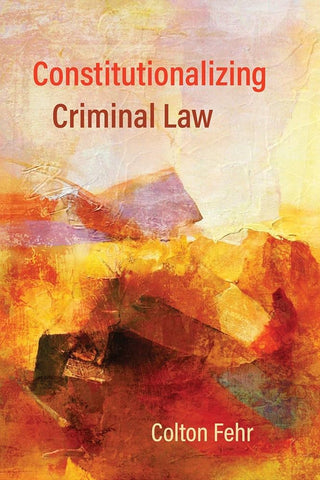Constitutionalizing Criminal Law
- Unit price
- / per
-
Author:FEHR Colton
-
ISBN:9780774867672
-
Publication Date:August 2022
-
Edition:1
-
Pages:266
-
Binding:Paperback
-
Publisher:University of British Columbia Press
-
Country of Publication:Canada


A Back Order button means that we don’t have the book in stock at our store. It may already be on order – or we can order it for you from a publisher or distributor at no additional cost.
As we source items from around the globe, a back-order can take anywhere from 5 days to several weeks to arrive, depending on the title.
To check how long this might take, you’re welcome to contact us and we can provide an ETA or any other information you need. We recommend checking the timeframe before committing to an online order.
Constitutionalizing Criminal Law
- Unit price
- / per
-
Author:FEHR Colton
-
ISBN:9780774867672
-
Publication Date:August 2022
-
Edition:1
-
Pages:266
-
Binding:Paperback
-
Publisher:University of British Columbia Press
-
Country of Publication:Canada
Description
A clarion call for an overhaul of the modus operandi of Canada's Supreme Court.
Constitutionalizing Criminal Law calls for an overhaul of the way the Supreme Court of Canada has developed the relationship between criminal and constitutional law. After the adoption of the Charter of Rights, the Court employed principles of criminal law theory when striking down criminal laws. More recently, it has invoked principles of instrumental rationality in doing so. In both cases, the Court has consistently turned to the concept of fundamental justice to constitutionally challenge criminal laws in place of specifically enumerated rights. The existence of multiple avenues to challenge criminal laws constitutionally raises the question: Which set of rights should the Court employ? This book argues that rights decisions should be based on enumerated rights where possible, the principles of instrumental rationality abandoned, and the principles of criminal law theory invoked only when an unjust criminal law cannot otherwise be challenged under the Charter.
Adding product to your cart
You may also like
A Back Order button means that we don’t have the book in stock at our store. It may already be on order – or we can order it for you from a publisher or distributor at no additional cost.
As we source items from around the globe, a back-order can take anywhere from 5 days to several weeks to arrive, depending on the title.
To check how long this might take, you’re welcome to contact us and we can provide an ETA or any other information you need. We recommend checking the timeframe before committing to an online order.
You may also like
You may also like
-
A clarion call for an overhaul of the modus operandi of Canada's Supreme Court.
Constitutionalizing Criminal Law calls for an overhaul of the way the Supreme Court of Canada has developed the relationship between criminal and constitutional law. After the adoption of the Charter of Rights, the Court employed principles of criminal law theory when striking down criminal laws. More recently, it has invoked principles of instrumental rationality in doing so. In both cases, the Court has consistently turned to the concept of fundamental justice to constitutionally challenge criminal laws in place of specifically enumerated rights. The existence of multiple avenues to challenge criminal laws constitutionally raises the question: Which set of rights should the Court employ? This book argues that rights decisions should be based on enumerated rights where possible, the principles of instrumental rationality abandoned, and the principles of criminal law theory invoked only when an unjust criminal law cannot otherwise be challenged under the Charter.
-
-
Author: FEHR ColtonISBN: 9780774867672Publication Date: August 2022Edition: 1Pages: 266Binding: PaperbackPublisher: University of British Columbia PressCountry of Publication: Canada
A clarion call for an overhaul of the modus operandi of Canada's Supreme Court.
Constitutionalizing Criminal Law calls for an overhaul of the way the Supreme Court of Canada has developed the relationship between criminal and constitutional law. After the adoption of the Charter of Rights, the Court employed principles of criminal law theory when striking down criminal laws. More recently, it has invoked principles of instrumental rationality in doing so. In both cases, the Court has consistently turned to the concept of fundamental justice to constitutionally challenge criminal laws in place of specifically enumerated rights. The existence of multiple avenues to challenge criminal laws constitutionally raises the question: Which set of rights should the Court employ? This book argues that rights decisions should be based on enumerated rights where possible, the principles of instrumental rationality abandoned, and the principles of criminal law theory invoked only when an unjust criminal law cannot otherwise be challenged under the Charter.
-
Author: FEHR ColtonISBN: 9780774867672Publication Date: August 2022Edition: 1Pages: 266Binding: PaperbackPublisher: University of British Columbia PressCountry of Publication: Canada
-




